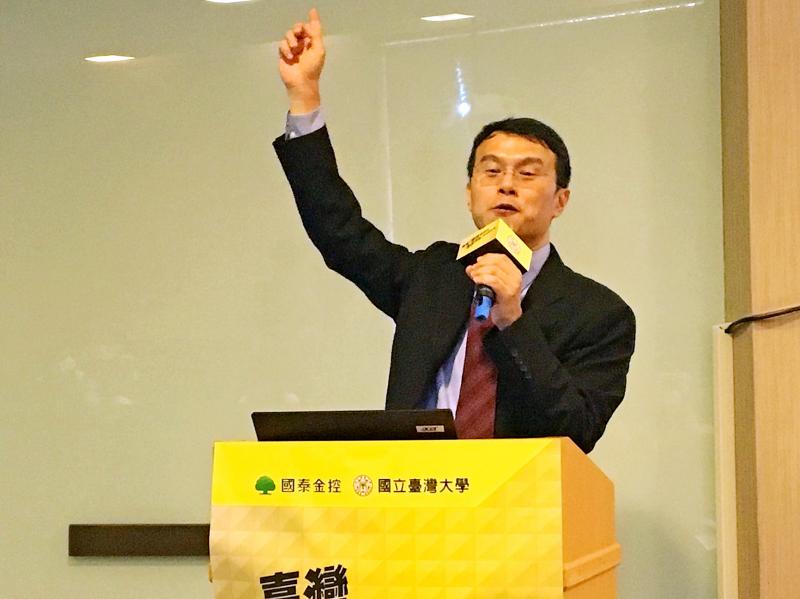Cathay Financial Holding Co (國泰金控) yesterday lowered its forecast for the nation’s GDP growth for a second time this year to 1.7 percent, from the 1.8 percent it predicted in June, due to weaker-than-expected economic performance in the first half of the year.
“The local economy grew slower than our expectations at 1 percent in the first six months, with an annual gain of 0.78 percent, which could be attributed to worse-than-expected private consumption,” said Hsu Chih-chiang (徐之強), an economics professor at National Central University who heads a research team commissioned by Cathay Financial.
Nevertheless, Cathay Financial’s latest forecast is still more optimistic than the Directorate-General of Budget, Accounting and Statistics’ (DGBAS) prediction of 1.56 percent growth and the central bank’s forecast of a 1.6 percent expansion, as the company is more upbeat about exports and private consumption, Hsu said.

Photo: Allen Wu, Taipei Times
“We do not think exports will be as sluggish as the government has forecast, as local manufactures are smart enough to ship their goods in advance of any ban that might result from US-China trade tensions,” he said.
For example, the nation’s exports last month hit a record US$31.17 billion, as some suppliers of Huawei Technologies Co (華為) shipped their products before Washington’s sanctions on the Chinese company took effect on Tuesday last week, he added.
“Exports likely hit US$28 billion this month, which would raise the third quarter’s total exports to US$88 billion, beyond the government’s prediction of US$84 billion,” Hsu said.
In the second half of this year, private consumption is expected to stage a rally strong enough to offset a 3.26 percent decline in the first half, which would result in a 0.72 percent dip for the whole year, milder than the DGBAS’ prediction of 1.44 percent, he said.
Cathay Financial expects the economy to recover next year with annual growth of 2.9 percent, which would be higher than the nation’s average GDP growth of 2.7 percent over the past 10 years, Hsu said.
That is more conservative than the DGBAS’ prediction of 3.92 percent growth, as Cathay Financial thinks that US-China trade tensions and Washington’s new sanctions on Chinese firms are likely to disrupt global supply chains, which local companies could fall prey to, he added.
Taiwanese companies would have to find new customers if their relationship with Chinese companies change, he said, adding that firms might also need to adopt new production models due to changing global supply chains.
“While the government has predicted a V-shaped recovery in the economy, Cathay Financial tends to expect a swoosh-shaped rebound, which means that it would take a long while for the economy to get back to the pre-pandemic situation due to uncertainty,” Hsu said.

Sweeping policy changes under US Secretary of Health and Human Services Robert F. Kennedy Jr are having a chilling effect on vaccine makers as anti-vaccine rhetoric has turned into concrete changes in inoculation schedules and recommendations, investors and executives said. The administration of US President Donald Trump has in the past year upended vaccine recommendations, with the country last month ending its longstanding guidance that all children receive inoculations against flu, hepatitis A and other diseases. The unprecedented changes have led to diminished vaccine usage, hurt the investment case for some biotechs, and created a drag that would likely dent revenues and

Global semiconductor stocks advanced yesterday, as comments by Nvidia Corp chief executive officer Jensen Huang (黃仁勳) at Davos, Switzerland, helped reinforce investor enthusiasm for artificial intelligence (AI). Samsung Electronics Co gained as much as 5 percent to an all-time high, helping drive South Korea’s benchmark KOSPI above 5,000 for the first time. That came after the Philadelphia Semiconductor Index rose more than 3 percent to a fresh record on Wednesday, with a boost from Nvidia. The gains came amid broad risk-on trade after US President Donald Trump withdrew his threat of tariffs on some European nations over backing for Greenland. Huang further

CULPRITS: Factors that affected the slip included falling global crude oil prices, wait-and-see consumer attitudes due to US tariffs and a different Lunar New Year holiday schedule Taiwan’s retail sales ended a nine-year growth streak last year, slipping 0.2 percent from a year earlier as uncertainty over US tariff policies affected demand for durable goods, data released on Friday by the Ministry of Economic Affairs showed. Last year’s retail sales totaled NT$4.84 trillion (US$153.27 billion), down about NT$9.5 billion, or 0.2 percent, from 2024. Despite the decline, the figure was still the second-highest annual sales total on record. Ministry statistics department deputy head Chen Yu-fang (陳玉芳) said sales of cars, motorcycles and related products, which accounted for 17.4 percent of total retail rales last year, fell NT$68.1 billion, or

Macronix International Co (旺宏), the world’s biggest NOR flash memory supplier, yesterday said it would spend NT$22 billion (US$699.1 million) on capacity expansion this year to increase its production of mid-to-low-density memory chips as the world’s major memorychip suppliers are phasing out the market. The company said its planned capital expenditures are about 11 times higher than the NT$1.8 billion it spent on new facilities and equipment last year. A majority of this year’s outlay would be allocated to step up capacity of multi-level cell (MLC) NAND flash memory chips, which are used in embedded multimedia cards (eMMC), a managed